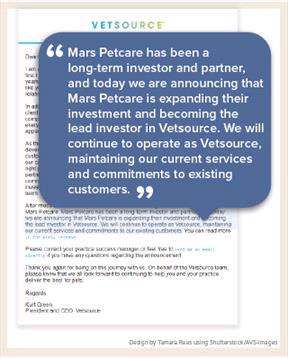Vetsource email

Vetsource told its veterinary clients by email on Friday that Mars Petcare is becoming its "lead investor." The move gives the world's largest owner of veterinary clinics a controlling interest in a company that had been perceived as a supporter of independent practices.
Mars Inc., the biggest veterinary company in the world, has acquired a controlling interest in Vetsource, an online pharmacy, prescription management and analytics business with more than 9,000 clinic customers.
In an announcement Friday, Doug Drew, president of Mars Veterinary Health North America, said the company is eager to "accelerate" Vetsource's business "to benefit the entire veterinary and pet ecosystem." The announcement does not provide details. As privately held businesses, Mars and Vetsource are not required to publicly disclose financials.
The sale continues the trend of consolidation in veterinary medicine. Vetsource's chief competitor, Vets First Choice, merged with Henry Schein Animal Health in 2019 to become Covetrus. At the time, Vets First Choice reportedly had 7,500 clinic customers.
Mars Petcare owns more than 2,500 pet hospitals and clinics worldwide, including the chains Banfield, BluePearl and VCA in the U.S. It sells pet food under brand names such as Royal Canin, Nutro, Greenies, Sheba, Cesar, Iams and Eukanuba. Other Mars Petcare businesses include Antech Diagnostics, one of the two dominant veterinary diagnostic laboratories in the country, and Wisdom Panel, which offers genetic tests for dogs and cats for pet owners and breeders.
Vetsource was founded in 2008. VCA, before it was acquired by Mars, was an early investor and customer of Vetsource. Banfield joined as customer in 2012. In 2018, Vetsource acquired VetSuccess, a practice management software and data analytics company; and Vet2Pet, a client communication service for veterinarians, in 2020.
Describing "the pet space as sort of frothy," Vetsource president and CEO Kurt Green said that during the past year potential investors and buyers expressed interest in the company. For his part, he was looking for resources to improve what the company was doing.
Mars watched with concern. "They've been an investor for a long time," Green said. "They are a big customer of ours, too. When they saw other parties interested in Vetsource, they were like, 'We really don't want you to end up in the wrong hands.' And the 'wrong hands' to them would be somebody who didn't care about the profession."
Green said that Mars' size, scale and financial backing will help Vetsource build out systems and infrastructure to deliver an experience that allows veterinarians to compete with large internet retailers, like Chewy, that are "a threat and a challenge" to the profession.
Customer concerns
Dr. Daniel Levenson learned about Mars' expanded role in an email from Green on Friday. Levenson owns two hospitals in Albuquerque and has been a Vetsource customer for a couple years. He expressed dismay over the loss of what he considered an ally of independent practices.
"Why would any independent practice recommend Royal Canin dog food, use Antech labs and now Vetsource, when the same parent company is pushing VCA and Banfield to compete directly with us?" he wrote in an email to the VIN News Service.
"What other profession has a private family try to own so many different facets of one profession and control so much of the conversation?"
Kurt Green

Vetsource photo
Speaking about Mars Petcare's investment in his company, Vetsource president and CEO Kurt Green said, "What was most important to us was to try to align with someone that really supports our vision."
Levenson said he'll probably discontinue using Vetsource. "There are not many (if any) alternatives out there, but sometimes principles and ethical behavior have to come before small profits," he said.
Mars Petcare's controlling stake in Vetsource also might raise concerns about practice data ending up in a competitor's hands. Such questions surfaced in 2011, when VCA Antech purchased Vetstreet, an online marketing and client-communication services company.
The purchase moved control of clinic information for nearly 5,000 veterinary practices to the owner of what was then the nation's largest chain of stand-alone veterinary hospitals. At the time, VCA claimed that practice information would be stripped of identifying details and protected by strong privacy agreements. Veterinarians told VIN News the assurances weren't enough. (VCA later sold a majority of Vetstreet to Henry Schein Animal Health.)
Practitioners also voiced concern about what would happen to practice data with the Vets First Choice-Henry Schein merger. They worried it might be used to cut them out of prescription sales. The company has stated repeatedly that its mission is to support veterinarians.
Green said he understands the question about whether Mars will use Vetsource data in some ways to give them a competitive advantage.
His answer is: "We have strong customer agreements already in place that provide good protection around confidentiality and data security. We have a long history of keeping clients' data very secure."
He added, "VCA or Mars has never had any interest in our data, and have no interest in that going forward." But he also said Vetsource is "open to taking a look at our data policies to see where we can be more explicit."
Green noted that Vetsource has experience juggling the interests of competing companies on its own board.
"I think one of the things we've navigated well over the years is this ability to interact with people who kind of compete in some areas but also cooperate in others," he said. At one point, the three largest veterinary distributors were owners in Vetsource — Patterson Animal Health, MWI Animal Health and Schein. "We had to be very careful about what we communicated around the boardroom."
After Schein merged with Vets First Choice, Vetsource bought out Schein's share. MWI and Patterson continue to be part of the company.